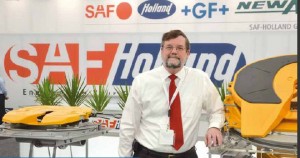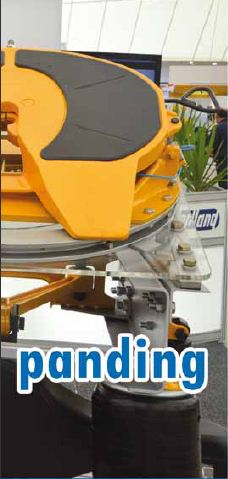Six-year-old JV with Madras Suspensions faring well
 SAF-Holland is one of the leading global manufacturers and suppliers of high-quality systems and components for trucks, trailers, buses and recreational vehicles. The company’s product range primarily comprises axle systems, fifth wheels, landing legs and kingpins.
SAF-Holland is one of the leading global manufacturers and suppliers of high-quality systems and components for trucks, trailers, buses and recreational vehicles. The company’s product range primarily comprises axle systems, fifth wheels, landing legs and kingpins.
SAF-Holland, a merger between SAF, a German trailer axle and suspension company, and Holland, a US-based company, has three business units focusing on specific customers’ needs, namely, the Trailer Systems Business Unit, Powered Vehicle Systems Business Unit and the Aftermarket Business Unit.
In a casual chat with MOTORINDIA, Mr. Jack L. Gisinger, President, SAF-Holland Inc., spoke about the company’s existing JV in India and future plans for the market.
In India, SAF-Holland has a joint venture with Madras Suspensions Ltd., namely, Madras SAF-Holland Ltd., with its manufacturing facility in Madurai for air suspension systems for buses and trucks. The company had entered India with keen interest in its growing bus segment.
Mr. Gisinger observed: “In developing markets, buses initially come with mechanical suspensions and then it moves to air suspensions, as people want a better ride. For us, bus suspension comes earlier than other products.”
Madras SAF-Holland has a manufacturing facility in Madurai where air suspension systems are made. The company supplies bus suspensions to reputed Indian OEMs, including Swaraj Mazda, Eicher and JCBL.
Mr. Gisinger expressed confidence that the featured suspension designed specifically for the Indian market would prove to be a differentiating factor for customers. The company also offers truck suspensions for heavy-duty applications such as mining and defence vehicles.
Though its products have gained acceptance among leading vehicle manufacturers, the company feels that the Indian market is unlike others. “The products we sell in Europe and the US may not sell here (in India). By the end of this year we’ll have good focus and be moving forward”, he added.
The current Indian JV is for the Powered Vehicle Business Unit. SAF-Holland’s contribution to the six-year-old JV comes mainly through specialised equipment, technical expertise and personnel training, while Madras Suspensions has provided the infrastructure, manpower and other facilities at the JV. The products manufactured in the Madurai facility are tailor-made for the Indian market. The company is not looking at export, though the Chinese market could possibly be an exception.
With a view to expanding its operations, Madras SAF-Holland is on the look-out for a new site with Chennai, Bangalore and Pune being the possible options. The company is keen on entering other segments, including the trailer segment in the country which has a lot of growth potential. There is occasional demand for trailer products which the company imports depending on the requirements. “We are the only company in the world to offer the complete trailer package globally, while there are others who offer it at region level”, he remarked.
The Madras SAF-Holland team is positive about reaping rich dividends for the efforts put in during the initial phase. The JV was formed with a 50-50 equity share between the partnering companies while discussions on the future prospects of the JV are in progress.
Mr. Gisinger is keen on expanding Indian operations and is sure that both SAF-Holland and Madras Suspensions would take the right steps forward in order to bolster growth. SAF-Holland has a policy of eventually establishing a wholly-owned company in countries where it has joint ventures, like in China where it took over one of its joint venture projects to set up a fully-owned subsidiary. Interestingly, the company is also involved in a 50-50 JV in Japan since 45 years, which has done extremely well since inception.
Expressing his views on the growth of India and China, Mr. Gisinger said: “The biggest thing that India has to do is to complete the infrastructure, because once that is done, goods can be moved faster and that’s the need. India has a much better rail network, which seems to delay road development. China has invested a lot of money for developing infrastructure and is perhaps five to ten years ahead of India in road infrastructure development. I have also seen a big difference in Indian roads since my first visit to the country six years ago.”